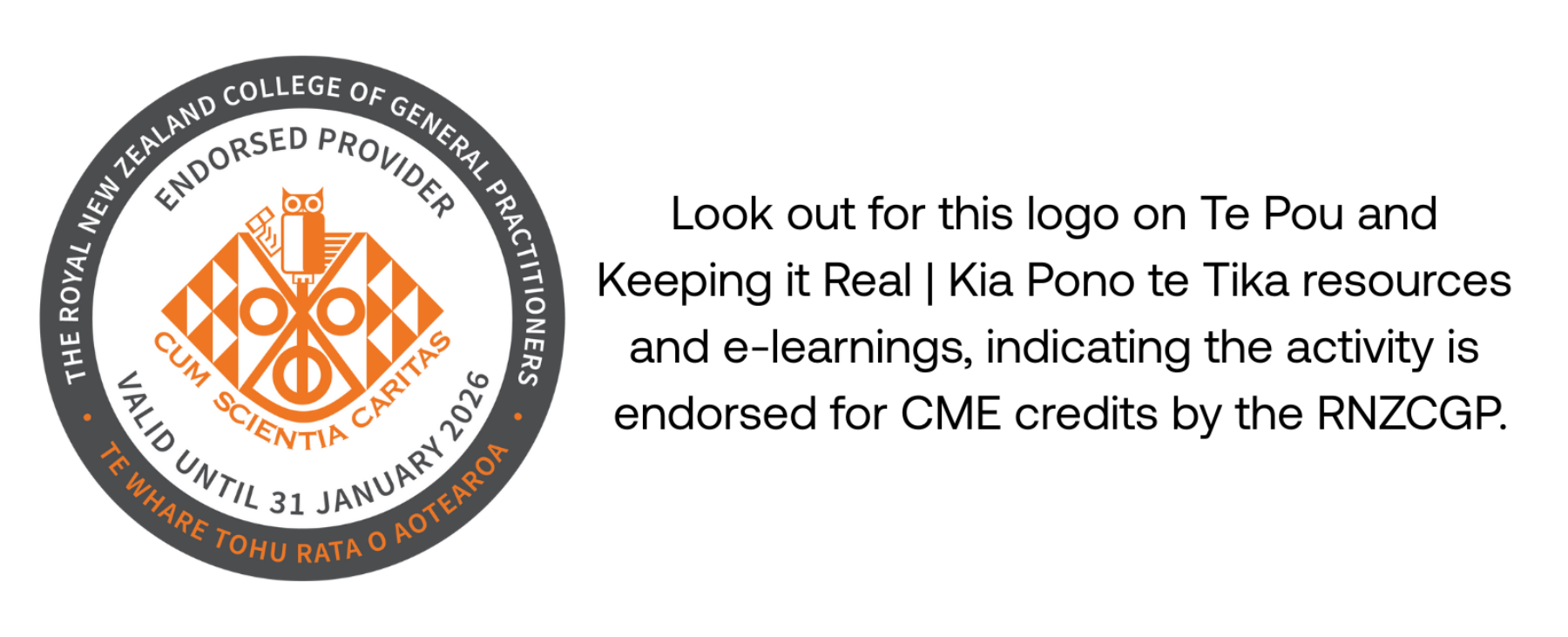Endorsed medical education for GPs
Te Pou is a national workforce centre for mental health, addiction and disability in New Zealand. Te Pou is endorsed as an accredited provider of educational resources for the Royal New Zealand College of General Practitioners (RNZCGP). GPs can access a range of resources to gain continuing medical education (CME) points towards their annual recertification.
Te Pou promotes resources that enhance knowledge and skills for working with people and whānau with mental health and addiction needs. Te Pou focuses on resources that help practitioners address inequity in access to health services and skills such as working with Māori, trauma and addiction that impact on how people and whānau access services
Let's get real
Let's get real is a framework that describes the values, attitudes, knowledge and skills required for working effectively with people and whānau experiencing mental health and addiction needs.
Equally Well
Equally Well is a group of people and organisations with the common goal of achieving physical health equity for people who experience mental health and addiction issues.
Te Pou resources and CME points allocation
The following activities have been endorsed by the RNZCGP and have been approved for the specified CME credits for CPD purposes.
Credit or points are generally given based on one per learning hour, although Te Pou has the discretion to apply more points to resources that address inequity.
Please note, Te Pou e-learning modules are hosted on an external learning management system, Moodle. You will need to create a Moodle account to access the e-learning modules. You will only need to do this once in order to access a range of the Te Pou courses available.

-
Arataki: A Let's get real approach to leadership
2 CME pointsArataki is an approach applicable to all leaders in Aotearoa New Zealand and provides valuable resources for leadership at a personal level, a team and a service level.
-
Worker Wellbeing
2 CME pointsWorker Wellbeing is a component of the Let’s get real framework. Links to resources are included with a range of short videos where health sector workers and leaders talk about worker wellbeing.
-
Let's get real Peer Coaching micro-learning
2 CME pointsThe Let's get real: Peer coaching micro-learning offers brief, practical, easy-to-follow lessons of 5-15 mins that can help you strengthen your supervision and coaching skills and become a more effective leader. Here’s a quick look at what’s inside:
1. Reflecting on coaching – Learn how reflection can enhance your coaching approach.
2. Setting up a peer coaching conversation – Discover how to structure your coaching conversations for better results.
3. Reinforcing the coaching model – Deepen your understanding of the ICA coaching model and develop core skills like listening, curiosity, and compassion.
4. The "Unreasonable friend" – Learn how to challenge your coachee in a supportive yet accountable way.
5. The coach's perspective – Understand when and how to share your own perspective to broaden your coachee’s thinking. -
Let's get real Working with Māori e-learning
4 CME pointsThe Working with Māori e-learning assists workers to increase their understanding of working effectively with Māori tāngata whai ora and whānau to improve health outcomes. These skills are essential for all people working in New Zealand health services.
-
Let's get real Working with whānau e-learning
3 CME pointsThe Working with whānau e-learning reflects the values, attitudes, knowledge, and skills of working effectively with whānau. Workers with this set of skills will ensure that whānau receive support to achieve their health and wellbeing goals. These skills are essential for all people working in New Zealand health services.
-
Let's get real Tātou tātou being with people and whānau e-learning
3 CME pointsThe Tātou Tātou being with people and whānau e-learning aims to assist health sector workers to develop their understanding of how to engage effectively with tangata mātau ā-wheako (people with lived experience) and whānau to help them achieve their wellbeing goals.
-
Trauma-informed and responsive approaches e-learning
3 CME pointsThe Trauma-informed and responsive approaches e-learning will enhance your trauma-informed knowledge and skills to apply in everyday practice. Topics include trauma in Aotearoa, trauma-informed approaches in health settings, trauma responsive approaches for working with people and whānau, and importantly, worker wellbeing.
-
Substance withdrawal management: Guidelines for medical and nursing practitioners
3 CME pointsThe updated substance withdrawal management guidelines reflect current best practice for substance withdrawal management with support from the New Zealand Ministry of Health. This resource is designed to provide readily accessible and appropriate information for health practitioners and provides guidance for safe substance withdrawal management in a range of settings.
-
Equally Well: Evidence update
3 CME pointsThe Equally Well: Evidence update July 2020 looks at achieving physical health equity for people with experience of mental health and addiction issues.
-
Equally Well prescribing toolkit
4 CME pointsThe Equally Well prescribing toolkit was developed to assist the conversations between a prescribing health professional and a person accessing their service about wellbeing and physical health. This includes specific implications of the medication(s) they are, or may be, prescribed and information on what could be involved in discontinuing the medication.
-
Equally Well: Improving primary care for people with mental health or substance-use conditions
2 CME pointsThe 26-slide Improving primary care for people with mental health or substance-use conditions presentation is designed for primary care clinicians to enhance their understanding of diagnostic overshadowing. This happens when there is an attribution of presenting symptoms to an existing mental health or substance use diagnosis rather than a potential co-occurring physical health issue. Overshadowing can prevent people from getting the health care they need and contributes to poorer health outcomes in people with mental health or substance use conditions. The slides highlight strategies and system-level actions for clinicians to recognise overshadowing and ensure everyone receives the physical health care they deserve.
We also have a range of e-learning modules available that do not contribute to CME points but are free to complete and may be of interest.
Key Contacts

